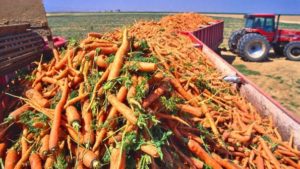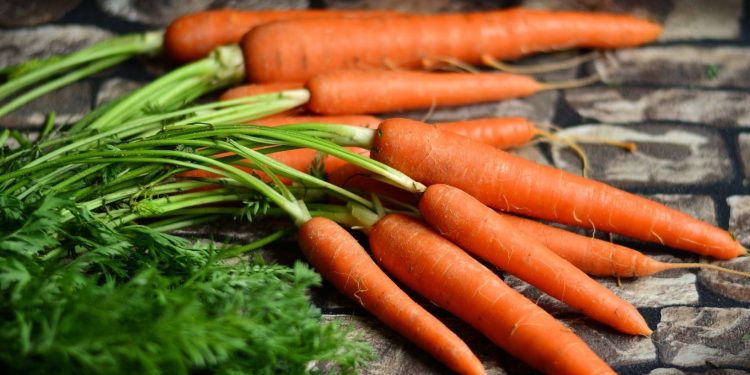Carrot Farming Information Guide:

Introduction:
Carrots are easy to grow in a garden with deep, loose soil; and as you may have guessed from the name, they are packed with beta carotene. A 1/2 cup serving gives you four times the Recommended Daily Allowance of vitamin A in the form of beta carotene. Growing and harvesting carrots is a great way to take advantage of their nutritional benefits. Carrot Farming plays a major role in the Indian economy as it is a major vegetable crop in India.
Varieties of Carrots in India:
- Hills: Ooty-1, Early Nantes and New Koroda
- Plains: India Gold, Pusa Kesar, and Half Long Danvers
Best Soil for Growing Carrots:
Carrot is a cool climate season crop and when grown at 15°C to 20°C will develop good color. The carrot crop needs a deep loose loamy soil. It requires a pH ranging from 6.0 to 7.0 for higher yielding.https://imasdk.googleapis.com/js/core/bridge3.510.1_ru.html#goog_620771810https://imasdk.googleapis.com/js/core/bridge3.510.1_ru.html#goog_620771812
Best Season for growing Carrots:

- Hills: At an elevation above 1500 meters, Carrot can be grown throughout the year under assured irrigation. At elevations between 1000 – 1500 meters, Carrot can be grown in July – February.
- Plains: August.
Seed sowing rate of Carrot:
3.5 to 4 kg/ha.
Plant Spacing of Carrot:
Mark the rows with spacing of 25 – 30 cm apart. Sow the seeds mixed with sand (one portion of seed with 4 portions of sand).
Thinning of Carrot Plants:
Hills: 10 cm between plants and Plains: 5 cm between plants.
Preparation of Land for Carrot Plantation:
Hills: Prepare the land to a fine tilth and form raised beds of 15 cm height, one-meter breadth, and convenient length.
Plains: Two ploughings are given and ridges and furrows are formed at 30 cm spacing.
Seed treatment of Carrot:
- Seed treatment with cow pat pit @ 3 g in 1 liter of water for 24 hours
- Seed treatment with 5% Trichoderma viride
- Seedling root dip with 5% Pseudomonas fluorescens before transplanting
Irrigation for growing Carrots:
Water supply should be given once in five days. During the drought period, after giving irrigation in the evening, beds should be covered with wet gunny bags. This prevents excessive water loss during sunny days. Germination of the seeds is also improved.
Manures and Fertilizers requirement for growing Carrots:
- Green manuring with lupin 60 days before planting
- Sprinkling horn manure to the soil at the time of land preparation @ 75g/ha by dissolving it in 40 liters of water
- Applying of well-decomposed farmyard manure @ 50 t/ha at the time of land preparation
- Applying of biodynamic compost @ 5 t/ha at the time of land preparation
- Applying of vermicompost @ 5 t/ha at the time of land preparation
- Applying neem cake @ 1250 kg/ha at the time of land preparation
- Applying of biofertilizers, Azospirillum, and Phosphobacteria @ 25 kg each/ha at the time of land preparation
- Spraying cow pat pit @ 5 kg/ha in 100 liters of water on 45th, 60th and 75th day after planting
Weed Control in Carrot Farming:
After cultivation, the first weeding is to be done on the 15th day. Thinning and earthing up should be given on the 30th day.
Growth regulators in Carrot Farming:

- Foliar spraying of panchagavya @ 3 percent at 10 days interval from the 1st month after sowing
- Spraying 10% vermiwash 5 times at 15 days interval from one month after sowing
- Foliar spray of horn silica @ 2.5 g/ha in 50 liters of water on the 65th day after sowing to increase the yield and quality of the carrot roots
Pests & Diseases in Carrot Farming:
Carrot is not much affected by pests.
Root-knot nematode:
- Application of neem cake @ 1 ton/ha the time of sowing to control root-knot nematode, Meloidogyne spp
- Growing carrot once in 3 years by following crop rotation
- Growing marigold once in 2 years
- Application of Paecilomyces lilacinus @ 10 kg/ha before sowing seeds
Leaf spot:
- Foliar spray of 5% Manchurian tea filtrates 3 times at one-month interval from one month after sowing/planting.
- Foliar spray of 3% Dasagavya at 10 days interval from the 1st month after planting.
Soil-borne diseases:
- Application of Trichoderma viride @ 5 kg/ha at the time of land preparation.
- Application of Pseudomonas fluorescens @ 5 kg/ha at the time of land preparation.
The yielding of Carrots:

25 – 30 tonnes/hectare in 100 – 120 days.
Transport and Marketing:
Can be transported through trucks to local markets.
































